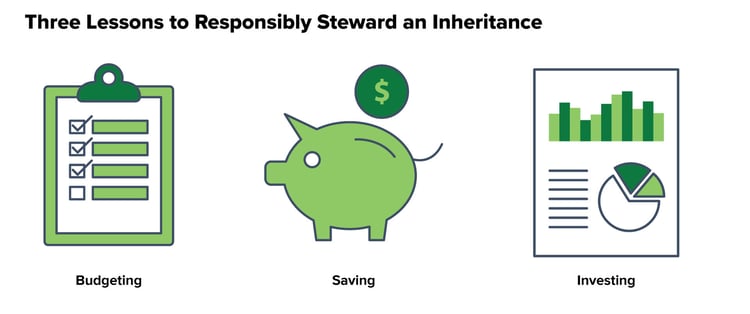Building assets to leave for your spouse, children, or other heirs is an aspiration for many. But it’s only one part of the equation when it comes to generational wealth transfers. It’s equally, if not more, important to make sure that your heirs are ready to inherit your money and other assets before the time comes. And while we all hope to live long and healthy lives, the reality is that life happens, and you never know for sure when the time will come.
With that in mind, there are a few specific challenges to overcome before your family’s generational wealth transfer occurs.
The importance of living within your means
Millennials expect to inherit $68 trillion throughout the 2020s decade, so it’s vital that this younger generation is prepared for such a massive wealth transfer.1 What could happen when people suddenly receive large sums of money when they aren’t ready to handle it responsibly?
Unfortunately, there is plenty of data that points to a bad outcome.
The classic example is a professional athlete. Many tend to be financially stable throughout their careers as income comes in. But often, these careers are short-lived. And when the paychecks end, adversity often begins, as more than 70% of professional athletes experience financial hardship soon after their playing careers are over.2
Lottery winners–who receive a one-time infusion of cash–more closely mirror the circumstances around inherited money. Similarly, they also provide hard-learned lessons. Almost one-third of lottery winners eventually declare bankruptcy, and despite having millions of dollars in newfound wealth, they are far more likely than the average American to declare bankruptcy within three to five years of their win.3
This brings us to inheritance. Obviously, not all inheritance situations are multi-million-dollar windfalls, so it’s difficult to generalize. But according to one study, more than one-third of people who inherit money end up seeing either no change or a decline in their net worth sometime after.3 And more alarmingly, the average recipient of an inheritance spends about half of what they receive.4
Of course, there are some good reasons to spend inherited money. For example, if you have excessive debt, it can be a savvy financial move to use your inheritance to pay it off. But when you consider the number of people who see a decline in net worth, it seems clear that it isn’t all being spent in constructive ways.
The concept of creating generational wealth is a big reason why Americans aim to leave money to their kids, but a staggering 70% of rich families lose their wealth within two generations.5
Ok, so we think you got the point–being unprepared for a windfall can lead to financial hardship. So how do you prepare your heirs to responsibly receive and manage your gift?
The importance of living within one’s financial means is one of the best lessons to learn. Let’s examine this and other readying strategies.
How to get your heirs ready for their inheritance
One of our biggest issues as a country is that the U.S. as a whole has generally done a poor job of educating people about money. In many states, personal financial education is not required in school, and the average American adult can only correctly answer about 50% of basic personal finance questions.6
Since they aren’t getting financial education in school, it’s extremely important for your children and heirs to learn about money at home.
Start with having conversations about money. This topic is up there with politics and religion–typically off-limits in many family conversations, and that’s even true among wealthy families. One report found that only 10% of rich families give their heirs a concrete idea of what they’re set to inherit, never mind what to do with it once they have it.7
You don’t necessarily need to share exact dollar amounts if you’re uncomfortable doing so. But it’s smart to have conversations about proper budgeting to give them the tools to live within their means. Share some of the reasons why you’re in a position to leave them an inheritance. For example, if you’ve invested successfully over the years, share what you’ve done and what you’ve learned. If you allocate a certain percentage of your income to savings or investments, explain why you do so.
How to best prepare your heirs for their inheritance
 If you want to make sure your heirs are ready for their inheritance (or if you are expecting to receive an inheritance yourself), here are three important skills to learn:
If you want to make sure your heirs are ready for their inheritance (or if you are expecting to receive an inheritance yourself), here are three important skills to learn:
Budgeting. One of the most important habits to establish before an inheritance is received is good budgeting skills. There is certainly more than one way to budget, but the general idea is to make sure your expenses are significantly less than your income, leaving money to save for retirement and emergencies.
One popular budgeting technique is known as the 50/30/20 rule. This method allocates 50% of your take-home pay to things you need—such as housing, transportation, groceries, and utilities. Then, 30% is destined for "wants"—that is, things you don't need, like dining out and vacations. The final 20% is allocated to saving and your own financial health. Retirement savings, college savings, and emergency savings are in this category, and so is debt repayment, such as credit card bills.
Saving. Knowing how to save is another important skill to master for a successful wealth transfer. As mentioned, the average person who receives an inheritance only saves about half of it—for both long- and short-term savings. We think people need to have both.
For example, our Wealth Advisors often suggest that an ideal target is to have several months’ worth of expenses saved in readily accessible emergency funds, but over half of Americans can’t cover a $1,000 unexpected expense without borrowing the money or selling something.8
In addition, more than one-fourth of Americans have absolutely no retirement savings, and even the average person who does may not be saving enough to achieve the retirement financial freedom they desire.
Investing. Finally, we believe one of the best ways to potentially ensure lasting wealth is to invest.
For example, the S&P 500 has historically returned 10% per year, on average, over the last 97 years.9 So, if you invested $100 in the S&P 500 at the beginning of 1926, you would have about $1.1 million at the end of 2022, assuming you reinvested all dividends. And even when accounting for inflation, you still would have returned nearly 7% per year.
Looking at a more realistic example, let’s say that your children inherit $100,000 when they’re 40 years old. If they invest the full amount in an S&P 500 index fund and that investment simply matches the long-term performance of the stock market, they could potentially have over $1 million at age 65.10
Don’t just leave money—create a legacy
Do you find yourself in a position to leave a sizable inheritance to your children? While it’s nice to give money and other valuable assets to your heirs, without the proper knowledge to help them be good stewards of those assets, they may not be able to sustain this financial security.
In a nutshell, the transfer of assets can make someone rich. But without the knowledge to be a responsible steward of those assets, it may not create lasting generational wealth for your family.

Like what you're reading?
Join the thousands of readers getting stories like this delivered straight to their inbox every Thursday — for free. Give it a spin, enter your email to sign up.
Footnotes
1newsweek.com, Apr. 26, 2023
2“Broke” documentary, ESPN, 2018
3Next Gen Personal Finance, Jan 18, 2023
4Ohio State News - Mar. 14, 2012
5CNBC "Make It", Jan. 16, 2020
6CNBC, Jan. 16 2020. Survey conducted annually by the TIAA Institute and George Washington University’s Global Financial Literacy Excellence Center
7Washington Post, Accessed May 5, 2023.
8Bankrate. Jan. 2022
9From 1926-2022. Data sourced from Robert Shiller. Calcualtions by officialdata.org. Accessed May 8, 2023
10Return calculated by calculator.net for an inital investment of $100,00 over 25 years with an annual rate of return of 10%.
Related Articles

Could Your Health Savings Account Boost Your Retirement Readiness?
A health savings account, or HSA, is a specialized type of account designed to help people with...

Could an In-Service Distribution Be a Good Idea for You?
If you have a retirement plan at work — especially if you're at least 59 ½ years old — you may have...

How Has the Stock Market Performed During Recessions? You Might Be Surprised
A recession is loosely defined as a decline in economic activity and employment. There isn’t one...
